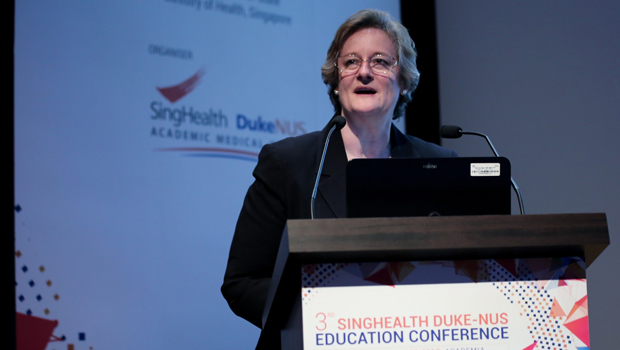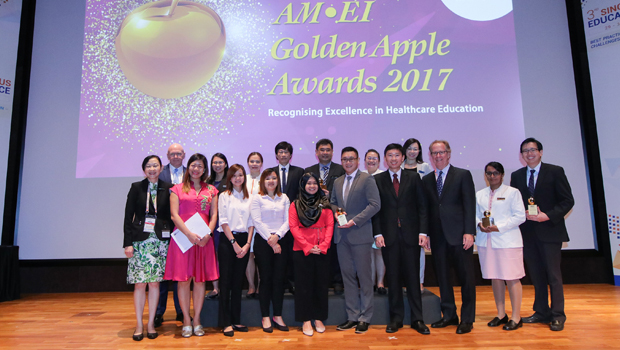Complex shifts in the healthcare demographic have been at the root of several structural and national-level initiatives, with the Health Ministry restructuring entire healthcare clusters in a move to meet these challenges head on.
More than 1,000 participants packed the Academia at SGH Campus for the SingHealth Duke-NUS Education Conference, now in its third run.
The biennial signature event promises to be an event worth attending for any healthcare educator and learner, and its emphasis on interprofessional education couldn't come at a better time.
Complex shifts in the healthcare demographic have been at the root of several structural and national-level initiatives, with the Health Ministry restructuring entire healthcare clusters in a move to meet these challenges head on.
Guest of Honour Senior Minister of State for Health Mr Chee Hong Tat reiterates the call for interprofessional education, "Healthcare professionals need to go beyond their area of specialisation and collaborate with other healthcare and also non-healthcare professionals, to provide integrated quality care for patients."
Citing examples of how medical education in the SingHealth Duke-NUS Academic Medical Centre (AMC) has improved through the launch of five medical colleges, a partnership with Duke-NUS Medical School, and the innovative use of medical technology, Mr Chee expressed his confidence that the AMC will continue to enhance and increase the amount of interprofessional learning throughout its institutions.

Sharing her personal experiences as an educator in the interprofessional faculty at the renowned Massachusetts General Hospital (Mass General) is keynote speaker Associate Professor Deborah Navedo. She offered some advice for the educators in our AMC.
Establish a common language
Approach interprofessional education as a team of faculty rather than as a medical professional. Teaching learners to work effectively as a team should start with educators leaving their silos at the door.
Understand each other's role in the care continuum
Assoc Prof Navedo shared that as a nurse she used to have little knowledge of how some of the other professionals impact the care of her patients. Having interest in knowing what the patient goes through will allow educators to shape curriculum that is relevant and integrated throughout the patient's journey.
Used a shared competency framework as part of curriculum and assessment
Using the Mass General example, she shared the four main areas that cut across all the different medical professions – communications, teaming, knowing each other's roles, and professionalism and ethics.
Learn to trust each other
Medical professionals traditionally work in silos, each with their own set of rules and norms. One of the main stumbling blocks when it comes to interprofessional education is when one profession does not trust another to give feedback or assess their students.
Despite the obvious challenges, Assoc Prof Navedo is optimistic for interprofessional education in Singapore, "This education conference is the crucible for innovation. I urge that you find a seat next to someone who is not in the same profession as you are, and ask them about some of the ways they have solved your patients' problems."
The SingHealth Duke-NUS Education Conference runs from 29 to 30 September 2017.
Recognising excellence in education
The Annual AM•EI Golden Apple Awards were also given out at the opening ceremony of the conference.
Congratulations to the winners!

Click here for the full list of winners.
